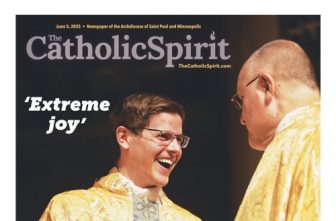
When considering the Catholic belief of the Eucharist as a sacred mystery, many Muslims could find common ground within their own faith, said Bob Brenneman, a professor and former evangelical pastor who spent 15 years sharing the Gospel with Muslims in the Middle East before becoming Catholic.
Just as the Church doesn’t fully understand how bread and wine are changed into the body and blood of Christ through God’s power and the Holy Spirit’s action during transubstantiation, Muslims don’t fully understand why they feel moved when passages from Islam’s sacred book, the Quran, are recited in Arabic, even though the vast majority don’t read the book in that language, said Brenneman, who attends both St. Lawrence-Newman Center in Minneapolis and Maternity of Mary in St. Paul.
Muslims have told Brenneman they’ve felt “transfixed” when they hear the Quran recited, and that “something happened. I don’t have to understand it.”
Brenneman’s acceptance of Church teaching on the Eucharist and conversion to Catholicism in about 2020 followed years of sensing the mystery in it and discovering liturgical worship as a Pentecostal pastor, sharing the Gospel first in Chicago and then in the Middle East.
Brenneman and his family spent more than 15 years in Turkey, Cyprus and Iraq in the 1980s and ‘90s, evangelizing through friendship and Bible study in areas where open Christian proselytizing wasn’t permitted.
In 1982, Brenneman and his family moved to Turkey to minister to Kurdish Muslims. For two and a half years, they lived in a medium-sized southeastern city Brenneman didn’t want to identify to protect the Muslim converts with whom he worked. It was there he first experienced liturgical worship at an Orthodox church.
Brenneman developed a rapport with the pastor who — once convinced that Brenneman didn’t intend to convert his Orthodox members — helped Brenneman connect with Muslims who sought information about Christianity. In that location, Brenneman said he ministered to more than 10 residents who gathered for worship and study.Now living in Minnesota, Brenneman hopes to help a new generation in bringing the Gospel to Muslims and people of other faiths. He has long taught at several local evangelical colleges, and in his current work as an adjunct professor at the University of Northwestern in Roseville, Brenneman introduces students to non-Christian religions and reaches out to non-Christian international students.
“I’m trying to get my voice out there a little bit at the seminaries and to places where I meet Catholics to say, can you do something on Islam, can you do something on the other religions?” Brenneman said.
During his first year of college, Brenneman had a faith conversion. While he considered how to give his life to Christ, a missionary he met suggested he work with the Kurdish people, an Iranic ethnic group native to Kurdistan in Western Asia, which spans southeastern Turkey, northwestern Iran, northern Iraq, and northern Syria. The Kurds, Brenneman learned, are descended from the ancient Iranian people, the Medes, who are mentioned numerous times in the Bible.
Before the Iowa native responded to that call, Brenneman spent a number of years helping those with substance use disorders in Chicago during his first pastoral assignment. Brenneman also briefly pastored a small church in Chicago, and without knowing much then about the Catholic teaching on transubstantiation, he emphasized to his congregation the importance of Communion.
“I always had a real strong reverence for Communion, even though I wasn’t Catholic or knowing about the Catholic understanding of it,” he said.
From Brenneman’s experience working with Muslims both in the Middle East and in the United States, he said God may give them understanding of aspects of Christian faith through dreams or they may be drawn to mysteries such as the Eucharist. Either way, Brenneman said he “always looks for open doors to share.”“There has to be an encounter with truth, and Islam denies the basic truth of the Gospel, especially the cross and the Trinity,” Brenneman said.
Brenneman’s encounters with the truth of the Eucharist — including what he’s heard from a number of priests in the archdiocese — influenced him to become Catholic, though his respect continues for the good he sees the evangelical denomination doing in sharing the Christian faith with Muslims and other non-believers.
“If some of that fire could be caught on into the Catholic Church and some of that stability of 2,000 years could be turned on to the evangelicals, we’d have quite a combination,” he said.
Brenneman identified five major issues in which Islam challenges the essence of historic Christianity:
- The alleged corruption of the Christian Scriptures,
- The Trinity,
- Christ’s divinity,
- Jesus as the Son of God, and
- Jesus’ crucifixion on the cross and his resurrection from the dead
(From Brenneman’s book, “Rekindling the Fire Among the Nations of Pentecost: How the Peoples of the Bible became Muslims and Why Many are Now Coming to Jesus”)




